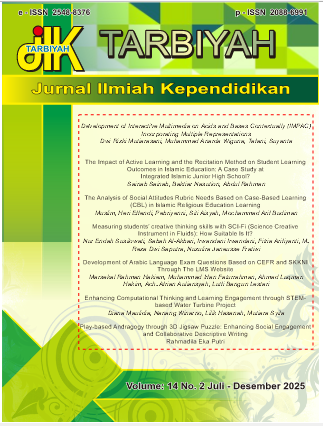The Analysis of Social Attitudes Rubric Needs Based on Case-Based Learning (CBL) in Islamic Religious Education Learning
DOI:
https://doi.org/10.18592/tarbiyah.v14i2.16690Keywords:
attitude assessment rubric, social attitudes, caseb-based learning, Islamc Religious EducationAbstract
This research analyzes the social attitudes rubric needs based on Case-Based Learning (CBL) to objectively assess students’ social attitudes in Islamic Religious Education (PAI) learning. Using a descriptive qualitative approach, the data were gathered by observation, interviews with the lecturers and students, and document study. The research result showed an urgent need for a CBL rubric that contains a measurable indicator of collaboration, empathy, responsibility, and social responsiveness. The Case-Based Learning (CBL) integrity has proven a possibility of assessing the attitude more contextually through a real case study relevant to the students’ lives. In conclusion, this rubric development is important to improve the consistency and objectivity of attitude assessment in Islamic Religious Education. This rubric could be a practical reference for lecturers in evaluating a systematic social attitude, strengthening the internalization of socio-religious values in students.References
Adawiah, R., Kiptiah, M., & Kamariah, N. (2023). Penerapan penilaian sikap siswa pada pembelajaran online. Integralistik, 34(1), 7–12. https://doi.org/10.15294/integralistik.v34i1.39476
Agus, A., Umar, F., Sailan, M., & Amin, M. A. (2023). Case based learning in Pancasila education courses. Technium Social Sciences Journal, 50, 392–396. https://doi.org/10.47577/tssj.v50i1.9917
Apriyani, R., Gloriani, Y., & Khaerudin, I. R. (2022). Model kontekstual berorientasi kearifan lokal pada materi cerita rakyat. Jurnal Tuturan, 11(1), 36. https://doi.org/10.33603/jt.v11i1.6348
Ashirova, Z., Zholdasbekova, S., Konakbayeva, U., & Akhmet, L. (2022). Educating a student’s legal culture: A new approach to developing a learning model. European Journal of Contemporary Education, 11(3), 696–707. https://doi.org/10.13187/ejced.2022.3.696
Aziz, A. (2022). Tantangan ilmu pendidikan agama Islam di era 4.0. IRJE: Jurnal Ilmu Pendidikan, 2(3), 1070–1077. https://doi.org/10.31004/irje.v2i3.123
Buhrig, R. (2023). The case for case-based learning in police recruit training. The Police Journal: Theory, Practice and Principles, 97(2), 336-353. https://doi.org/10.1177/0032258X231181322
Dahuri, D., & Wantini, W. (2023). Learning Islamic religious education based on Ta’dib perspective of Islamic education psychology at Muhammadiyah Pakel Elementary School. Journal of Islamic Education and Ethics, 1(2), 95–108. https://doi.org/10.18196/jiee.v1i2.9
Demina, R. T., Darmansyah, D., Jubba, H., & Mudinillah, A. (2022). Implementation of integrated learning of Islamic religious education to improve student’s social attitude competence. Tadris Jurnal Pendidikan Islam, 17(1), 85–99. https://doi.org/10.19105/tjpi.v17i1.5818
Desombre, C., Delaval, M., & Jury, M. (2021). Influence of social support on teachers’ attitudes toward inclusive education. Frontiers in Psychology, 12, 736535. https://doi.org/10.3389/fpsyg.2021.736535
Dodds, P., Wyse, R., Jones, J., Wolfenden, L., Lecathelinais, C., Williams, A., Yoong, S. L., Finch, M., Nathan, N., Gillham, K., & Wiggers, J. (2014). Validity of a measure to assess healthy eating and physical activity policies and practices in Australian childcare services. BMC Public Health, 14(1), 572.
https://doi.org/10.1186/1471-2458-14-572
Elliott, S. N., Davies, M. D., Frey, J. R., Gresham, F. G., & Cooper, G. (2018). Development and initial validation of a social emotional learning assessment for universal screening. Journal of Applied Developmental Psychology, 55, 39–51. https://doi.org/10.1016/j.appdev.2017.06.002
Eryandi, E. (2023). Integrasi nilai-nilai keislaman dalam pendidikan karakter di era digital. Kaipi: Kumpulan Artikel Ilmiah Pendidikan Islam, 1(1), 12–16. https://doi.org/10.62070/kaipi.v1i1.27
Farid, A., & Rugaiyah, R. (2023). Manajemen internalisasi nilai pendidikan karakter pada siswa. Jurnal Basicedu, 7(4), 2470–2484. https://doi.org/10.31004/basicedu.v7i4.5965
Fitrah, A., Yantoro, Y., & Hayati, S. (2022). Strategi guru dalam pembelajaran aktif melalui pendekatan saintifik dalam mewujudkan pembelajaran abad 21. Jurnal Basicedu, 6(2), 2943–2952. https://doi.org/10.31004/basicedu.v6i2.2511
Gyagenda, A. (2021). Integration of modern ICTs as modes of instruction for Islamic education in higher institutions of learning. Interdisciplinary Journal of Education, 4(2), 133–145. https://doi.org/10.53449/ije.v4i2.62
Guilfoos, T., & Pape, A. D. (2020). Estimating Case-Based Learning. Games, 11(3), 38. https://doi.org/10.3390/g11030038
Hartati, Y. L. (2023). Analisis dampak pendidikan karakter terhadap perkembangan sosial dan emosional siswa. Jurnal Multidisiplin Indonesia, 2(7), 1502–1512. https://doi.org/10.58344/jmi.v2i7.310
Hasudungan, A. N., Suboh, A. S., & Nababan, S. A. (2024). Urgency of evaluation of Sekolah Penggerak program through the CIPP model (Context, Input, Process, Product): A critical study. Education & Learning, 4(1), 23–32. https://doi.org/10.57251/el.v4i1.1288
Hidayat, N., Tanod, M. J., & Prayogi, F. (2022). Manajemen pengembangan sekolah dasar berbasis pendidikan karakter. Jurnal Obsesi: Jurnal Pendidikan Anak Usia Dini, 6(5), 4910–4918. https://doi.org/10.31004/obsesi.v6i5.2688
Ilham, D. (2020). Challenge of Islamic education and how to change. International Journal of Asian Education, 1(1), 9–20. https://doi.org/10.46966/ijae.v1i1.16
Jaka, N. J. A., & Bustam, B. M. R. (2023). The relevance of Ibn Sina’s concept of Islamic education to independent learning education. At-Tajdid Jurnal Ilmu Tarbiyah, 12(2), 104–114. https://doi.org/10.52640/tajdid.v12i2.319
Jannah, A. N., Putri, S. N., Yahya, R. N., Dewi, D. A., & Furnamasari, Y. F. (2021). Peran pendidikan kewarganegaraan dalam mewujudkan sekolah damai di tengah-tengah kehidupan masyarakat pluralis. Jurnal Basicedu, 5(6), 5266–5274. https://doi.org/10.31004/basicedu.v5i6.1604
Khanif, A. (2023). Islamic religious education learning strategy for alpha generation. Ascarya Journal of Islamic Science, Culture, and Social Studies, 3(1), 36–45. https://doi.org/10.53754/iscs.v3i1.461
Kuswandi, I. (2020). Tahapan pengembangan moral: Perspektif Barat dan Islam (Telaah terhadap gagasan Thomas Lickona, Lawrence Kohlberg dan Al-Qur’an). Ar-Risalah Media Keislaman Pendidikan dan Hukum Islam, 18(1), 158. https://doi.org/10.29062/arrisalah.v18i1.329
Latifah, M., Fatchiatuzahro, & Irawan, H. (2024). Penguatan pendidikan karakter dalam integrasi nilai-nilai Islami. Rayah Al-Islam, 8(2), 407–416. https://doi.org/10.37274/rais.v8i2.950
Mursalin, H. (2022). Tantangan guru pendidikan agama Islam pada era Society 5.0. Edukasi Islam: Jurnal Pendidikan Islam, 11(001), 216–228. https://doi.org/10.30868/ei.v11i4.3344
Naima, M. Y., Nursyam, E., & Fitri, R. (2024). Implementation of Islamic religious education learning in building students’ social attitude. Tafkir: Interdisciplinary Journal of Islamic Education, 5(1), 171–183. https://doi.org/10.31538/tijie.v5i1.1052
Nasir, R., & Maknun, C. L. (2022). Refleksi penilaian kontribusi pada team-based project secara daring. Aksioma, 11(1), 48–56. https://doi.org/10.22487/aksioma.v11i1.1905
Negru, I. A., & Paloș, R. (2023). Tools for assessing students’ socio-emotional competencies: A systematic literature review. Journal of Educational Sciences, 47(1), 113–127. https://doi.org/10.35923/jes.2023.1.07
Nurdiyanto, N., Musyfiq, A., Karman, K., & Nursobah, A. (2024). Independent curriculum development strategy in Islamic religious education: Conceptual studies of building character and nationality. Tarbiyah: Jurnal Ilmiah Kependidikan, 13(1), 65–80. https://doi.org/10.18592/tarbiyah.v13i1.12072
Nurhalita, N., & Hudaidah, H. (2021). Relevansi pemikiran pendidikan Ki Hajar Dewantara pada abad ke-21. Edukatif: Jurnal Ilmu Pendidikan, 3(2), 298–303. https://doi.org/10.31004/edukatif.v3i2.299
Nurhikmah, N. (2024). Character Education Islam From The Views Of Imam Al-Ghazali. Jurnal Al Burhan, 4(1), 53–66. https://doi.org/10.58988/jab.v4i1.300
Nurlailah, S., & Hamdu, G. (2021). Implementasi assessment sikap berpikir kritis berbasis Education for Sustainable Development (ESD) di sekolah dasar. Ideas: Jurnal Pendidikan Sosial dan Budaya, 7(3), 309. https://doi.org/10.32884/ideas.v7i3.390
Pavić, Ž. (2021). The impact of civic and religious social capital on the antisocial attitudes of the youth: A multi-level cross-national study. Societies, 11(3), 110. https://doi.org/10.3390/soc11030110
Purnamasari, I., Safitri, F., Asrul, A. A., Muham, S. E. S., & Perangin-angin, D. R. B. (2024). Pengaruh perkembangan Islam terhadap dunia pendidikan di Indonesia: Sebuah kajian historis. Islamic Education, 4(1), 13–18. https://doi.org/10.57251/ie.v4i1.1366
Ragalutu, H., Ibrahim, N., & Madokala, M. (2019). Existence and role of character education in the middle of digitalization of education 4.0. Science Proceedings Series, 1(2). https://doi.org/10.31580/sps.v1i2.802
Rahmawati, E., Asy’arie, M., Aryani, S., & Waston, W. (2022). Implications of multicultural content of Islamic religious education on high school students’ manners. In Proceedings of the International Conference on Education and Social Science (ICESS 2022). Atlantis Press. https://doi.org/10.2991/assehr.k.220708.034
Ramdani, E. (2018). Model pembelajaran kontekstual berbasis kearifan lokal sebagai penguatan pendidikan karakter. Jupiis: Jurnal Pendidikan Ilmu-Ilmu Sosial, 10(1), 1. https://doi.org/10.24114/jupiis.v10i1.8264
Sakiah, N. A., & Effendi, K. N. S. (2021). Analisis kebutuhan multimedia interaktif berbasis PowerPoint materi aljabar pada pembelajaran matematika SMP. JP3M (Jurnal Penelitian Pendidikan dan Pengajaran Matematika), 7(1), 39–48. https://doi.org/10.37058/jp3m.v7i1.2623
Saputri, L. T. A., & Ermi, N. (2024). The relationship of early breastfeeding initiation and exclusive ASI on the incident of stunting toddler ages (6–59 months) in Ogan Ilir District. JKM (Jurnal Kebidanan Malahayati, 10(1). https://doi.org/10.33024/jkm.v10i1.13283
Shohib, M., & Ernawati. (2018). Solusi atau masalah di era revolusi industri 4.0. Hukum dan Keadilan, 1(1), 87.
Sultani, D. I., Silalahi, C. A. P., & Ali, R. (2021). The learning strategy of Islamic education at primary school in implantation of Islamic thought values. Jurnal Ilmiah Sekolah Dasar, 5(1), 10-18. https://doi.org/10.23887/jisd.v5i1.28582
Sultani, S. (2023). Teori belajar humanistik dan penerapannya dalam pembelajaran pendidikan agama Islam. Ansiru PAI: Pengembangan Profesi Guru Pendidikan Agama Islam, 7(1), 177. https://doi.org/10.30821/ansiru.v7i1.16108
Suwarno, S., & Aeni, C. (2021). Pentingnya rubrik penilaian dalam pengukuran kejujuran peserta didik. Edukasi: Jurnal Pendidikan, 19(1), 161. https://doi.org/10.31571/edukasi.v19i1.2364
Suwarti, S., Laila, A., & Permana, E. P. (2020). Pengembangan media komik berbasis kearifan lokal untuk menentukan pesan dalam dongeng pada siswa sekolah dasar. Profesi Pendidikan Dasar, 7(2), 140–151. https://doi.org/10.23917/ppd.v7i2.11553
Syaifullah, S., & Amirkhan, O. A. (2023). Strategic management of inquiry-based multiple intelligences for enhancing PAI learning achievement. Managere: Indonesian Journal of Educational Management, 5(2), 125–134. https://doi.org/10.52627/managere.v5i2.335
Tanjung, Y., Darma, A., & Nasution, I. S. (2024). Role of teacher support and self-capability in engagement with students at MAS Tahfizhil Quran Medan. Education & Learning, 4(1), 46–50. https://doi.org/10.57251/el.v4i1.1295
Thelu, M., Webster, B., Jones, K. A., & Orrell, M. (2022). A cross sectional survey on UK older adult’s attitudes to ageing, dementia and positive psychology attributes. BMC Geriatrics, 22(1). https://doi.org/10.1186/s12877-022-03539-w
Topperzer, M. K., Roug, L. I., Andrés-Jensen, L., Pontoppidan, P., Hoffmann, M., Larsen, H. B., … Sørensen, J. L. (2021). Twelve tips for postgraduate interprofessional case-based learning. Medical Teacher, 44(2), 130–137. https://doi.org/10.1080/0142159X.2021.1896691
Vennebo, K. F., & Aas, M. (2021). Case-based Instruction for Leadership Learning in the Norwegian National School Leadership Program. Journal of Research on Leadership Education, 18(1), 63-79. https://doi.org/10.1177/19427751211029334
Widyanto, I. P., Merliana, N. P. E., & Pranata, P. (2020). Implementasi manajemen pembelajaran era revolusi industri 4.0 di Institut Agama Hindu Negeri Tampung Penyang Palangka Raya. Jurnal SMART (Studi Masyarakat, Religi, dan Tradisi), 6(1), 1–15. https://doi.org/10.18784/smart.v6i1.981
Xu, G., Lin, Y., Ye, Y., Wu, W., Zhang, X., & Xiao, H. (2024). Combination of concept maps and case-based learning in a flipped classroom: A mixed-methods study. Nurse Education in Practice, 76, 103918. https://doi.org/10.1016/j.nepr.2024.103918
Yusri, R. (2018, April 19). Pengembangan rubrik penilaian sikap berbasis KKNI dan SN-Dikti. https://doi.org/10.31227/osf.io/n47xh
Zamroni, Z., Baharun, H., Febrianto, A., Ali, M., & Rokaiyah, S. (2022). Membangun kesadaran santripreneur berbasis kearifan lokal di pondok pesantren. Al-Tijary, 7(2), 113–127. https://doi.org/10.21093/at.v7i2.4264
Downloads
Published
How to Cite
Issue
Section
License
Copyright (c) 2025 Heri Effendi, Muslim, Pebriyenni, Siti Aisyah, Mochammad Arif Budiman

This work is licensed under a Creative Commons Attribution 4.0 International License.
Authors retain copyright and grant the journal right of first publication with the work simultaneously licensed under a Creative Commons Attribution 4.0 International License that allows others to share the work with an acknowledgment of the work's authorship and initial publication in this journal.




